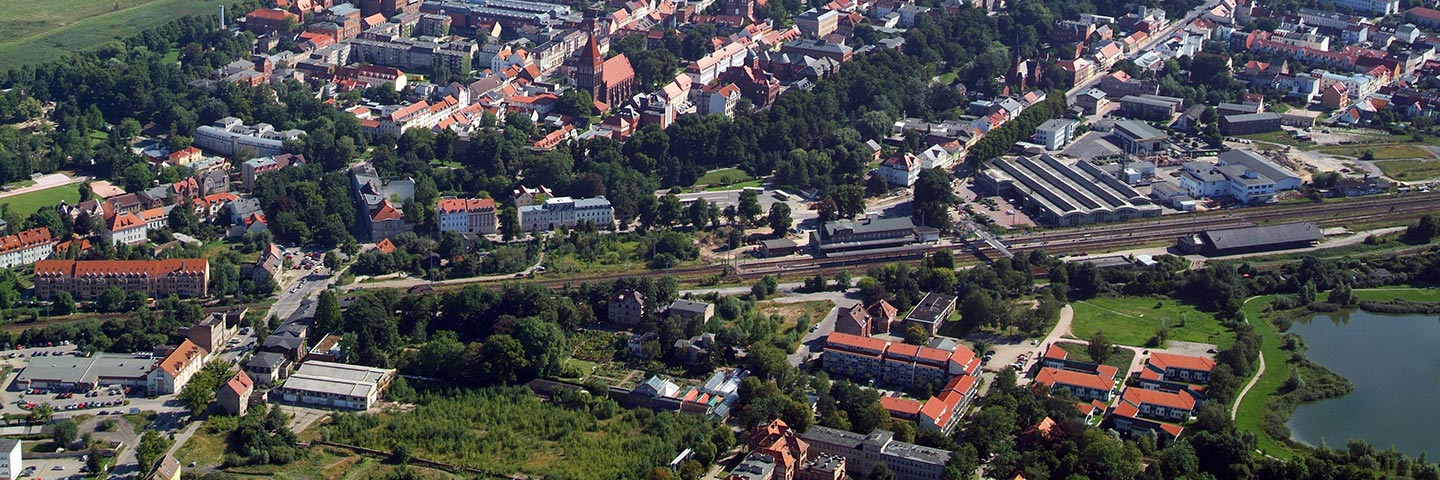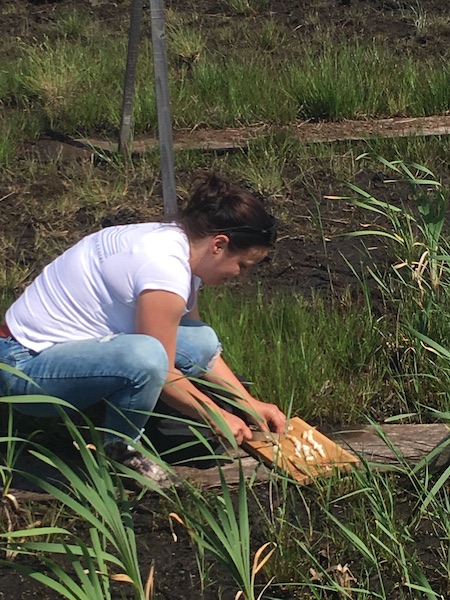News
2019
by NK
Peatlands at COP25
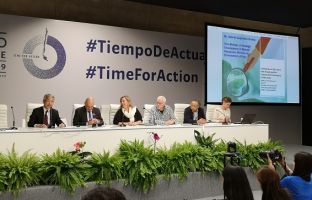
Summary: Topic set, huge need for action
13/12/2019 On 13th December the UNFCCC Conference in Madrid came to an end after tough negotiations. The summary of the peatland and climate team of the Greifswald Mire Centre on site: Unsatisfactory to sobering. The topics of peatland and climate protection, restoration and sustainable use were more present than ever before in the conference's supporting programme. On the opening day, the GMC had organized a side event "Mapping, Monitoring and Climate-Friendly Management of Peatlands" together with the Food and Agriculture Organization of the United Nations (FAO), the Japanese Agency for International Cooperation (JICA) and the Global Environmental Centre (GEC) from Malaysia. On 4th December, a theme day in the Indonesian country pavilion focused on climate-friendly peatland management, especially in tropical latitudes. On 5th December, the Global Peatlands Initiative, of which the GMC is a founding member, presented itself in the German national pavilion. Internationally, politicians as well as representatives of NGOs see wet and rewetted peatlands as an efficient nature-based solution for climate protection and adaptation to climate change.
by NK
GMC funding granted
NUE supports our work from Greifswald to Brussels
07/12/2019 For the next two years, the Norddeutsche Stiftung für Umwelt und Entwicklung (NUE) is supporting the development of the Greifswald Mire Centre. Scientific expertise on peatland is to be transferred to voluntary organisations and politics. The GMC leaders Dr. Franziska Tanneberger and Greta Gaudig recently spoke with Vorpommern farmers and nature conservationists, Chancellor Angela Merkel and EU parliamentarians about the potentials of moor climate protection. As a "generational change" is ongoing, NUE will support the partners in the GMC to strengthe capacity and maintain the GMC as a successful and thriving partnership. The University of Greifswald, partner in the GMC, will set up the first permanent professorship for peatland sciences in Germany in 2020 with the support of the state of Mecklenburg-Vorpommern and the Stifterverband der deutschen Wissenschaft.
by NK
Specifically: 5 measures for CAP
Proposals for peatland and climate protection
06/12/2019 In Germany, organic soils account for only 7% of the area used for agriculture, but cause 37% of the emissions from agriculture. The EU average is similar. However, the current Common Agricultural Policy (CAP) of the European Union (EU) does not take this into account. In the policy paper Promoting climate protection through peatland protection - Using the opportunities of CAP reform (German only), the Greifswald Mire Centre and Landcare Germany (DVL) now make proposals for the reorientation of the CAP in Germany that will hopefully feed into the upcoming reform of the CAP. The partners in the MoKli project suggest, among other things, more pilot areas and support programmes for sustainable peatland use and the recognition of climate protection achievements by ‚carbon farmers‘.
by NK
Sphagnum Species of the World
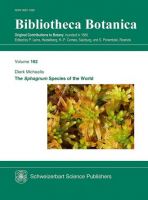
New book by GMC’s peat moss expert
05/12/2019 The comprehensive volume Sphagnum Species of the World by Sphagnum expert Dr. Dierk Michaelis has just been released in English. Peat mosses are of key ecological and economic importance among the mosses and populate almost all continents. In the book 292 Sphagnum species are described in detail and presents keys for their identification, supplemented by data on habitats, geographical distribution and lists of synonyms. 435 pages strong, the volume issued by Schweizerbart Science Publishers represents the updated, supplemented English language version of the author's original peat moss flora of 2011 (in German), the first overall presentation of Sphagnum since Carl Warnstorf's "Sphagnologia Universalis" of 1911. Thus, the Greifswald Mire Centre proudly congratulates its member and author Dierk Michaelis!
by NK
Reform = opportunity
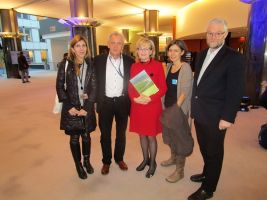
Talks on peatland farming in the EU Parliament
04/12/2019 The Common Agricultural Policy (CAP) is decisive for the agricultural use of peatlands in Europe. Although peatlands account for only 4% of agricultural land in the EU average, emissions from agricultural peatlands contribute 25% of total greenhouse gas emissions from agriculture. With the current reform of agricultural policy, there is a great opportunity to initiate a change in peatland management in Europe, to promote the management of rewetted peatlands and to phase out support on drained peatlands (see also recent GMC policy brief). Dr. Franziska Tanneberger (GMC), together with colleagues from Wetlands International European Association and Interreg Care-Peat project, spoke about peatland distribution and climate relevance in Europe to 13 members of the European Parliament, among them Vice President Mairead McGuinness (Ireland) and agricultural policy expert Peter Jahr (Germany).
by NK
Sit-in in the fisherman’s fountain
Greifswald Mire Centre at global climate strike
29/11/2019 Despite chilly temperatures and drab weather the GMC members came for a sit-in in the Greifswald fisherman’s fountain during the global climate strike at 29th November. While they had demonstrated in the same fountain in September - but standing - they now wanted to show: The climate crisis is getting more dramatic than anticipated and sea levels are rising. Worldwide three times more people will be affected by coastal flooding than hitherto predicted. We will not only get wet feet, but climate change will severely affect us if we do not take action. Global climate goals cannot be achieved without rewetting of peatlands worldwide. It is one of the most time- and cost-effective measures for climate protection but still rarely considered. In Mecklenburg-Vorpommern 30 % of the federal state’s greenhouse gas emissions are caused by peatland drainage – an amount that could largely be mitigated by rewetting.
by NK
In search of Nile Basin peat
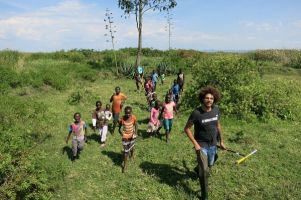
Mission to Nile Basin wetlands completed
09/11/2019 As part of the project „Biodiversity Conservation and Sustainable Utilisation of Ecosystem Services of Wetlands of Transboundary Relevance in the Nile Basin“ jointly implemented by GMC with Wetlands International and Nile Basin Initiative, an assessment of CO2 emissions avoidance potential of the Nile Basin wetlands is being prepared. A field trip to Ghana (in particular to Keta Lagoon wetlands) and Kenya took plave in late October/early November. The search for peatlands was based at peatland (probability) maps of GMC’s Global Peatland Database. At the end of rainy season, several shallow and partly also deeper (2 m and more) peatlands could be mapped.
by NK
Climate protection and agriculture
KTBL visits GMC and paludiculture pilot farms in Vorpommern
24/12/2019 The Kuratorium für Bau und Technik in der Landwirtschaft (KTBL) is an association of agriculture, science, commercial industry, administration and consultancy with the task of technology transfer; it is supported by the Federal Ministry of Food and Agriculture (BMEL). Prof. Dr. Christine Tamásy (University of Greifswald) mediated a visit of the GMC by the executive committee and the general management to get information about research and implementation projects. The view into the soil of an agriculturally used, wet grassland area at Lake Kummerow gives a special impression: Thanks to paludiculture, the carbon in the peat remains protected and the area is nevertheless productively used for biomass for local heating. The successful cooperation between Greifswald University and agricultural enterprises in establishing a cattail paludiculture on rewetted peatland was also praised, and the KTBL would like to make greater use of the expertise of the GMC in future.
by NK
PRIMA: Milestone reached
Typha and reed now grow on 8 ha
26/09/2019 After several months of preparation, young Typha seedlings were planted mechanically and reed seedlings were planted manually on the 8 hectare pilot site at Neukalen (MV), which was then rewetted. Within the next 2.5 years, the field trial will generate practical information on the technical implementation, plant growth, biomass quality and economic efficiency of Typha and reed paludicultures. With good growth, the first harvest is planned for next year. Additionally, mesocosm experiments, genetic investigations and knowledge transfer are carried out in the Paludi-PRIMA project. The project of University of Greifswald and Research Centre for Agriculture and Fisheries Mecklenburg-Vorpommern is funded by the Federal Ministry of Food and Agriculture (BMEL).
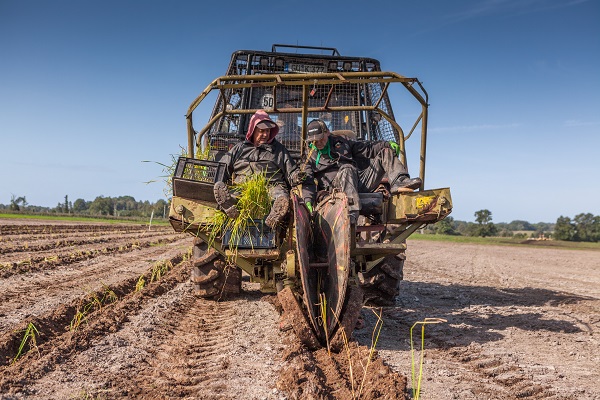
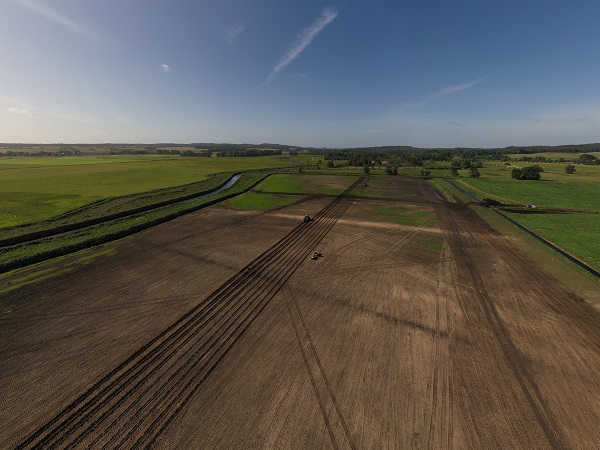
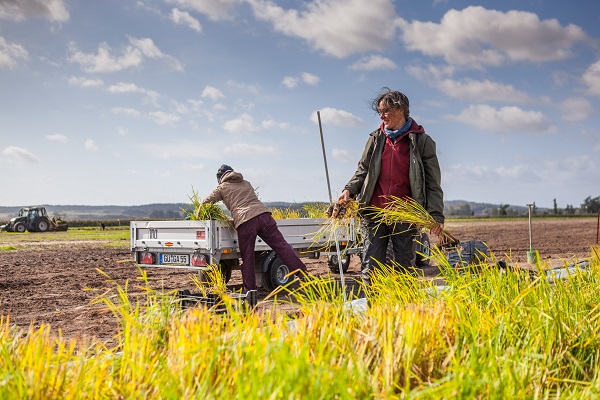
Installing the pilot site for cultivation of reed and typha wihtin the PRIMA project (Photos: T. Dahms)
by NK
Fact paper on Germany’s climate programme 2030
Peatland protection as nature-based solution
23/09/2019 The document "Key points for the climate protection programme 2030" published by the Federal Government on 20.09.2019 names sector-specific measures. For the agriculture and forestry sector, no concrete implementation steps have been laid down under "Protection of peat soils / Reduction of peat use in growing media (36)". The GMC fact paper "Peat soil protection as a nature-based solution in the climate protection programme 2030 - rapid cessation of peatland drainage necessary for effective climate protection" compiles the initial situation, potentials and concrete proposals on four pages.
by NK
Peatlands must be wet - immediately
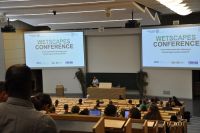
160 scientists agree at WETSCAPES conference
13/09/2019 Peatlands must be wet - immediately. A quick stop to peatland drainage is necessary to achieve global climate protection goals. This is a summary of the results of the international conference held 10.-13.09.2019 at the University of Rostock. 160 scientists from 20 countries discussed the results of their research in drained, rewetted and near-natural peatlands at the WETSCAPES conference. Representatives from various disciplines talked about plant growth, greenhouse gas emissions, nutrient losses and microbial processes in the soil. Most of these scientists deal with individual phenomena, and together they were able to establish clear relationships and connections between the results. This is particularly important for rewetted peatlands, as these systems represent completely novel ecosystems. The four-year joint research project WETSCAPES (derived from "wet" and "landscapes") is funded by the Excellence Research Programme of the State of Mecklenburg-Vorpommern with 5 million euros at the Universities of Greifswald, Partner in the Greifswald Moor Centrum, and Rostock. The abstract volume of the conference is available here.
by NK
High demand on paludiculture expertise
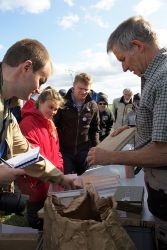
Excursions with international delegations
13/09/2019 During the last two months several delegations from all over the world travelled the north of Germany to be informed about paludiculture projects by the Greifswald Mire Centre. At the end of August, a Ukrainian delegation researched possible requirements for a sustainable, climate-friendly use of recently drained, state-owned peatlands that are to be privatised. The scientists of the GMC explained possibilities for paludiculture in a seminar and showed the harvest of cattail in Kamp and of wet meadow biomass in Neukalen as well as the "paludi biomass heating plant" in Malchin. In mid-September, a Vietnamese delegation visited these sites and travelled to Western Pomerania as part of the Plant3 project. A delegation of Finnish peatland scientists and students also made a stop at the paludiculture sites in the northeast after visiting the Sphagnum farming site in the peatland Hankhauser Moor near Oldenburg (Lower Saxony). Finland now plans to research and implement paludiculture more intensively.
by NK
Attaché visit to the GMC
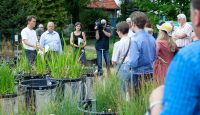
From Japan to Paraguay interest in peatland expertise in MV
30/08/2019 About 30 agricultural and environmental attachés from 14 countries from Japan to Paraguay, together with Dr. Till Backhaus, Minister of Agriculture and Environment in Mecklenburg-Vorpommern, visited the Greifswald Moor Centrum on 29 August. A great opportunity to show what Mecklenburg-Vorpommern and Greifswald peatland science have to offer: During a guided tour of the Karrendorfer Wiesen, a successfully revitalised coastal flood mire owned by the Michael Succow Foundation, the attachés were able to see and understand the significance of wet peatlands for biodiversity, climate protection and regional development "on the ground". At the research plots of the WETSCAPES project, part of the MV Excellence Initiative, and the mesocosm facility of the University of Greifswald, GMC representatives showed the current research. One week earlier, Elisabeth Aßmann, Chairwoman of the Agricultural Committee of Mecklenburg-Vorpommern, had gained an impression of successfully combined peatland, climate and coastal protection, including innovative value creation, on the same site. Here it became clear that peatland protection and paludiculture must be part of a sustainable agriculture in Mecklenburg-Vorpommern. Obstacles were also addressed: Rewetting is progressing too slowly in the federal state of Mecklenburg-Vorpommern. Planning and approvals take a long time.
by NK
Peatland conservation: Solutions on 84 pages
Report comprises all results of the MoorDialog project
29/08/2019 The MoorDialog project was funded by the German government’s National Climate Initiative from 2016-2019. Many important stakeholders of peatland and climate protection were reached and involved by events and publications within the project – building a #peatlandsmatter network in Germany. Another result of MoorDialog is the report Klimaschutz auf Moorböden - Lösungsansätze und Best-practice-Beispiele (“Climate protection on peat soils – solutions and Best-practice-examples”, German only), published within the Proceedings of the Greifswald Mire Centre. It recommends a possible transformation path for peatlands in Germany, as it would be necessary to achieve carbon neutrality by 2050. Now it is necessary to further develop this transformation path in dialogue and to bring the solutions more rapidly into society, politics, the economy and on the ground itself.
by NK
Revised RSPO Manual
Efforts to make palm oil more sustainable
06/08/2019 The Roundtable on Sustainable Palm Oil (RSPO) has revised ist manual on best management practices (BMPs) for management and rehabilitation of peatlands. The review and updating process has been facilitated by Global Environment Centre. The manual includes text and maps provided by the Greifswald Mire Centre.
by NK
Peatlands in the desert
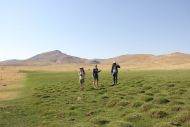
Data from Uzbekistan for Global Peatland Database
01/08/2019 There are peatlands in the desert state of Uzbekistan! Researchers of the Succow Foundation, partner in the Greifswald Mire Centre, found them in the high mountain range of the Tian Shan, in the foothills of the Nuratau and along the Syrdarya river. These peatlands with peat layers of 30-70 cm have been largely unknown and are threatened by high-intensity agricultural use and degradation. The data collected during field work in July will be fed into the Global Peatland Database (Link) and will thus expand the global knowledge on peatland distribution. The research was part of the CAViF project of the Succow Foundation and financed by the German Federal Ministry of Education and Research.
by NK
New: Paludiculture newsletter
Subscribe now!
28/06/2019 The Greifswald Mire Centre (GMC) would like to raise your awareness on the first issue of its paludiculture newsletter. With this newsletter the GMC aims to keep a growing community informed on peatlands and paludiculture. You will find news from research, practice, politics, as well as announcements of conferences and other events and recommended publications. The newsletter is issued at irregular intervals in German and English. If you wish to subscribe, please write an e-mail to communication(at)greifswaldmoor.de. It’s sufficient to put ‚Subscription for paludiculture newsletter‘ in the mail’s subject header. News on paludiculture send to this email address are also very welcome!
The newsletter is currently provided by the BOnaMoor Project.
by NK
Paludiculture studies for the Baltic States
Feasibility discussed in three workshops
24/06/2019 During the last two months stakeholders met in Estonia, Latvia and Lithuania to discuss the feasibility of paludiculture in the Baltic States. These workshops were organised by partners within the project ‘Paludiculture in the Baltics’, funded by the European Climate Initiative (EUKI). For each state a feasibility study and land classification for paludiculture was discussed. Representatives from agricultural and environmental ministries, other authorities, stakeholder associations (farmers, foresters) and the civil society acknowledged the relevance of adapted peatland management for the protection of organic soil carbon and mitigation of GHG emissions. They also discussed the agricultural policy framework for paludiculture and opportunities to overcome current regulatory obstacles by reforming EU’s Common Agricultural Policy (CAP). Despite the lack of ready-made business schemes and marketing options for paludiculture products participants were eager to push paludiculture further. And enjoyed tasting a typha snack and other gourmet paludiculture products…
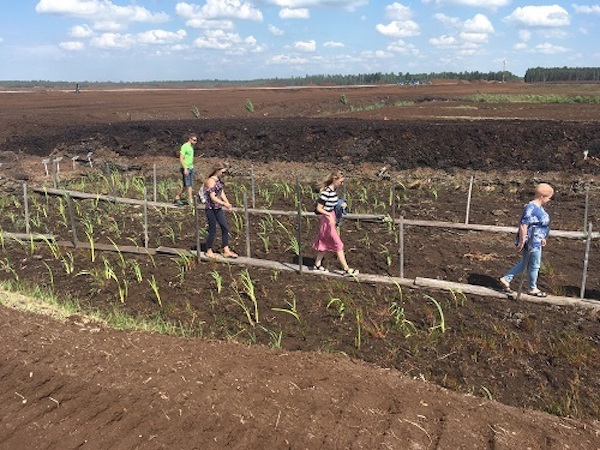
by NK
2627‐910X
New GMC proceedings
04/06/19 The Greifswald Mire Centre publishes the GMC proceedings for better accessibility and citation of own reports and other project results. Two new volumes are now available. In the first volume 2019, emission assessment for peatlands in Greifswald, management recommendations and other results of the MORGEN project are summarised; in the second volume, the current status and new ideas for voluntary finance instruments for peatland protection are presented. This study was carried out within the MoorDialog project. The Proceedings of the Greifswald Mire Centre with its own ISSN (2627-910X) already include two earlier publications (2018) and appear online at irregular intervals.
by NK
PRIMA puts paludiculture into practice
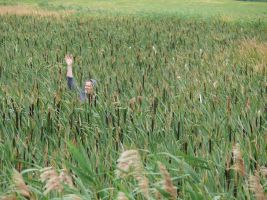
New project on Cattail and Reed
20/05/19 From May 2019, paludiculture on fen sites will be studied in depth by the new Project Bringing paludiculture into practice: integration – management – cultivation. 'Paludi-PRIMA' investigates the cultivation and profitability of Cattail (Typha latifolia, Typha angustifolia) and Reed (Phragmites australis). A demonstration site of approx. 10 ha will be established in NE Germany to gain large-scale experience, including machine planting and harvesting of Cattail. A mesocosm experiment investigates the influence of genetics, water level and nutrient availability on the development of plants and their biomass quality, e.g. the suitability as thatching reed. In addition, PRIMA aims at improving the framework conditions of paludiculture, organises field days and develops practical guidelines and recommendations. The three-year joint project is carried out by four working groups of the University of Greifswald in cooperation with the Research Centre for Agriculture and Fisheries Mecklenburg-Vorpommern. The project is funded by the German Federal Ministry of Food and Agriculture (BMEL).
by NK
Breakthrough for the Aquatic Warbler
Translocation in restored peatland successful
16/04/19 Already three Aquatic Warblers translocated in 2018 from a large breeding site in Belarus to a restored site in Lithuania have returned in the first days of May to Lithuania from the winter areas. This has proven for the first time that such conservation measure is possible and successful in this species. The translocation was part of a LIFE project. Details and pictures can be found here. The GMC supports the LIFE project as advisor and currently prepares a similar LIFE proposal for this global threatened mire species.
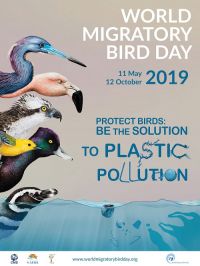
by NK
Nile basin peatlands seriously threatened!
Result of 3 weeks fieldwork + fact finding in 5 African countries
16/04/19 Three weeks of fieldwork in five countries within the Nile basin project of Greifswald Mire Centre and Wetlands International revealed worrying facts on conditions of peatlands there. Agriculture, farming, peat extraction and infrastructure projects seriously threaten peatlands in this transboundary region stretching over ten countries in total. For example, the scientists stated accelerated depletion of peatlands by burning and farming in Southeastern Uganda during the last 10 years. In Southeastern Rwanda peatlands are on the edge of disappearance: A new peat fueled electricity plant is being built in Gisagara and planned to start working in 2020. It is expected to threaten 8,000 ha of peatlands. There are also large peat extraction sites in Gishoma. The Nile basin project, conducted by the Greifswald Mire Centre, Wetlands International and further partners, assesses the potential of avoiding carbon emissions in the Nile basin wetlands. Based on mapping distribution and status of peatlands in the region recommendations for technical and political discussions will be developed.
by NK
MoKli – work on the ground large scale
Joining forces with land users for solutions
27/03/19 The new project MoKli – abbreviated and merged from the German terms ‘Moor’ (peatland) and ‘Klima’ (climate) – wants to implement practical solutions for sustainable peatland use by joining forces with land users. For this new project University of Greifswald and the Succow Foundation, both partner in the GMC, team up with the German Association for Landcare (DVL).
While facts on peatland and climate are sufficiently known, action is now urgently needed: MoKli therefore develops strategies for climate friendly use of peatlands in Germany and their regional adaptations. The project conveys knowledge on peatlands and paludiculture to land owners and users and to local authorities, associations and enterprises in the fields of water management, agriculture and nature conservation.
In five peatland-rich federal states of Germany MoKli will develop and apply cooperative solutions in model regions at water (sub)catchment area level. Together with local stake-holders, new production methods for the utilisation of peatland biomass will be initiated. In addition, the project wants to create and promote the profession of the 'peatland carbon farmer' (German: Moor-Klimawirt) who delivers ecosystem services to society and is recognised for doing so. Jointly with political decision-makers at local, state, federal and EU level MoKli acts to improve framework conditions for peatland climate protection.
by NK
UN resolution on peatlands
Joint efforts during UN Environment Assembly
15/03/19 The United Nations Environment Assembly of the United Nations Environment Programme adopted during its 4th session in Nairobi 11–15 March 2019 a resolution on UNEP/EA.4/RES.16 ‚Conservation and Sustainable Management of Peatlands‘. Published in 6 languages, the resolution urges member states and other stakeholders to give greater emphasis to the conservation, sustainable management and restoration of peatlands worldwide. The GMC supported UN Environment staff with background information and text. The resolution also calls for more coordinated effort and will be followed up by a workshop with global conventions and organisations co-organised by BfN, UN Environment, GMC and Wetlands International in May.
by NK
Thawing permafrost: one of 5 largest environmental threats
UNEP Frontiers report based on GMC expertise
07/03/19 The new report Frontiers 2018/19: Emerging Issues of Environmental Concern issued by the United Nations‘ Environmental Organisation (UNEP) defines five pressing but hitherto underestimated environmental threats. Thawing Arctic permafrost is one of them. The chapter Permafrost Peatlands: Losing ground in a warming world is authored by Prof. Hans Joosten (GMC).
Besides detailled background information the chapter offers a new circumpolar map on the distribution of permafrost and Arctic peatlands based on the Global Peatland Database of the GMC. UNEP’s „Frontiers“ reports regularely address environmental threats of global implications which are not yet being sufficiently recognised and tackled/fought against. The report is being translated into six languages and made available to governments and environmental institutions worldwide.
by NK
BOnaMoor + DESIRE
New projects starting
20/02/19 The Greifswald Mire Centre is happy about two new paludiculture projects starting: BOnaMoor aims at optimising thermal utilisation of fen biomass. Peatland scientists and landscape ecologists of Greifswald University examine its growth and yields at the agricultural enterprise Voigt. They will also conduct an economic and financial assessment. Engineers of the Hochschule für Technik und Wirtschaft Berlin specialised on renewable energies analyse combustion at the heating plant Malchin as well as in the laboratory.
The project is funded by the Federal Ministry for Agriculture through the Fachagentur für nachwachsende Rohstoffe (FNR). The international project DESIRE develops sustainable peatland management for nutrient retention and other ecosystem services through restoration and paludiculture within the Neman River catchment. The project is part of the regional programme Interreg Baltic Sea and is coordinated by the GMC (Greifswald University and Succow Foundation). It supports politicians and other decision-makers in assessing their region’s paludiculture potential and in utilising peatlands sustainably. DESIRE develops pilot sites, fosters communication on wet peatland management and assesses it economically.
